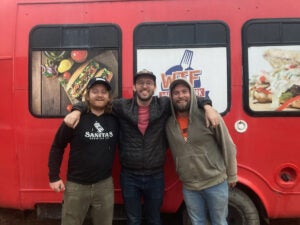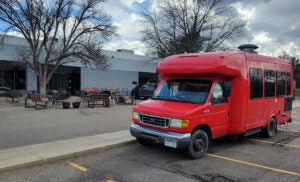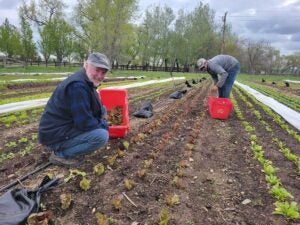As the farmer market season kicks off, one Colorado farm is taking things a step further by not just selling their produce at a market but preparing their produce into delicious meals at their newly acquired food truck, The Schlop Stop.
Sunburn Farms, managed by Michael Myrbeck, Shaun Burns, and Jacob Downey, launched a food truck in spring 2024 and serve weekly specials from the farm alongside locally sourced food.
The three originally met in school at the University of Hartford in Connecticut and became close friends and housemates; they moved to Colorado about five years ago.

Burns, who was looking for a career change, fell into farming when he started working for EsoTerra Culinary Garden, a farm based in Boulder that focuses on providing high-quality produce to restaurants and chefs.
Burns loved the fulfillment that came from farming and providing fresh food for others, and roped Myrbeck and Downey into the operation. When the opportunity came last year for the trio to manage their own farmland, they decided to become farmers full time.
Named Sunburn Farms as a nod to the many hours they spend under the Colorado sun in Boulder County, the three friends worked hard to cultivate and nourish their farmland, dedicating about half an acre to production.
Burns knew that he did not want to follow a traditional market-garden to farmer-market business model, preferring a similar model instead to what EsoTerra was doing, where the produce grown on the farm would directly go toward a meal.
When the opportunity to own a food truck came up, the three friends saw an opportunity to realize a dream they had in their undergraduate days.
Purchased in November, after obtaining the required food licenses and fixing up the truck, the Schlop Stop had a soft opening in Niwot, Colorado, in March and has been regular attendees at the Longmont Farmers Market ever since.

What’s the inspiration behind the name? Generally silly people, they liked to find random words to throw around, and schlop was a word they were using to describe using up random ingredients at the house together toward something edible.
It seemed to be a fitting name for their food truck, where they weren’t sure what meals were going to come out of it just yet.
“The meaning of the name has evolved over time — it means something more now,” Myrbeck said. :It’s a showcase of the locality of things, a full plate.”
As first-generation farmers, the three knew that having a strong business drive would be critical to their farm’s success, and they certainly found themselves a niche as a farm that owns a food truck rather than a food truck sourcing from local farms.
Aiming to funnel about 25 percent of their farm’s produce to the food truck, with the rest sold to catering businesses or restaurants, the Schlop Stop offers a rotating menu of freshly prepared produce at their farmer market.
The farm grows a medley of vegetables, from carrots, kohlrabi, zucchini, and more. Recently, the group harvested their first batch of salad greens, about five pounds of it, and served it as a side on their entrees at the food truck.
“Our main audience are people who go to farmers markets — folks who care about food quality, freshness, etc. and it’s been great to showcase our farm,” said Burns. “Our produce is coming out of the field Thursday, we prepare it on Friday, and sell it at the market on Saturdays.”
The freshness of their produce certainly shined through, as evidenced by the line at the market on normal Saturdays.
Burns, Myrbeck, and Downey all work the food truck, each taking on different roles and learning how to be chefs and prepare their produce as best as possible.
“We recently harvested our salad greens from the field, and I don’t hesitate to tell every customer that we grew these greens and picked this salad with our own hands,” said Myrbeck, who usually ends up working the counter and handles most of the customer interactions.

Myrbeck also touched on the importance of relying on neighbors in their community, especially as new farmers just starting out.
For example, while plans are underway to integrate chickens onto their farm, the Schlop Stop is currently sourcing their chicken and eggs from their neighbor, Crooked Root Farms, which also has a stand at the same farmers market.
“It’s a great way to market — come see the community network instead of just one vendor,” said Myrbeck. For those wanting eggs, the Schlop Stop can direct them to Crooked Root, and for those wanting those eggs cooked, they can try them from the food truck.
It’s an efficient and valuable partnership, where visitors can even occasionally see Myrbeck pop over to the Crooked Root farm stand to see if they had more eggs when the truck was starting to run low.
This kind of partnership and collaboration strengthens not just the market, but also the community and food access for all.
As Burns, Myrbeck, and Downey continue their journey as first-generation farmers, they hope to facilitate and build more community relationships like this between others.
As a farm with a food truck, they also hope to develop an educational model to teach consumers about “closing the loop.”
They want to show how their food is grown, harvested, prepared, and sold to their customers from start to finish and how customers can provide feedback and inform the farm about what should be grown.
For example, customers have shown a keen interest in their falafel, so Sunburn Farms is experimenting with growing garbanzo beans, a low-water crop that may be ideal in Colorado’s semi-arid conditions.
Unlike food trucks that source their food from farms, the Schlop Stop has the flexibility to grow directly what their customers request, rather than having to find different sources for different produce.
“We are trying to cater the land to suit our needs and working on being community makers rather than selling ourselves,” said Burns.
In the future, the three hope to cater to private events and build relationships with catering businesses and restaurants. While the Schlop Stop has just launched, the food truck is sure to become a Coloradan favorite.
Liza Thuy Nguyen served as the 2023 American Farmland Trust Agriculture Communications Intern at AGDAILY. Liza is originally from Anaheim, California, and attended the University of California, Davis, as a first-generation college student. She received a bachelor’s degree in genetics and genomics and went on to earn a master’s in horticulture from Penn State.



